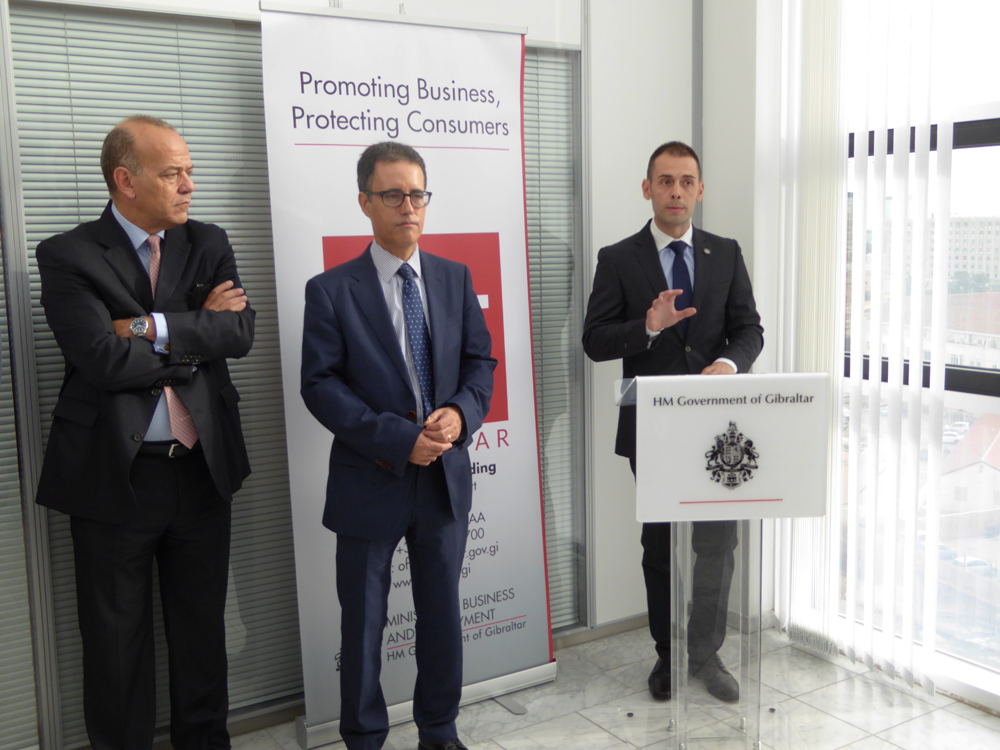May 04 - New Business Licensing Regime Under The Microscope – An Interview With Minister Costa
 Gibraltar’s new business licensing regime managed by the Office of Fair Trading was launched in October last year. Its guiding piece of legislation is the Fair Trading Act 2015 which introduces a streamlined licensing process that supersedes the previous trade licensing system.
Gibraltar’s new business licensing regime managed by the Office of Fair Trading was launched in October last year. Its guiding piece of legislation is the Fair Trading Act 2015 which introduces a streamlined licensing process that supersedes the previous trade licensing system.
YGTV caught up with the Minister for Business and Employment Neil Costa to review progress and tackle some criticisms which came to light in a recent GFSB survey on the changes. (See GFSB article here)
YGTV: It’s now been six months since the new regime has been in place. How has it gone so far?
Minister Costa: Any big piece of legislation takes a while for the public and the business community to fully assimilate. That’s why we introduced the law in such a way that there can be no criminal penalty that arises should a business not be fully aware of the licensing regime.
I think that those who have used the service are impressed in so far as we are providing, for the first time, a single point of contact so a businessperson who has never set up a business before can go to the new office and under that one roof the official can explain to that person all the different forms that need to be filled in and even help them to fill them out. The beauty of the single point of contact is that the forms are filled out and then the Office of Fair Trading makes itself responsible for distributing to all the different departments and agencies and ensuring they come back.
I’m also satisfied that the new processes of the business licensing authority are working in favour of businesses. Before, it used to take a 14-day notice period for advertisement in a daily paper and the Gazette - we’ve reduced this to just seven days. We’ve also introduced a fee for those wanting to make an objection to the issuing of a license. We did this because we used to have some companies filing objections as a matter of course whenever there was competition. There is now a statutory presumption in favour of granting a license unless it goes against the public interest or there is some other valid reason.
YGTV: Do you feel that the recent GFSB survey results are disappointing? After all, the survey found that 42% of those questioned said that new regulatory burdens like the licensing changes were having an impact on their business…
Minister Costa: Like with everything else, there will be a part of the act that businesses will not like and in this case it’s undoubtedly the fees. In that respect, I think it would be fair for the business community to remember that business license fees had not increased since 1988. I will be proposing to the GFSB and the Chamber that, in order to avoid a future administration in 20 years time increasing the fees that any increase should be pegged to the retail price index – last year it was 0.1%. Therefore the businessperson, who always has to plan ahead, will be able to budget for these increases.
I think it’s also fair to say that the GFSB and the Chamber were consulted entirely both on the substantive act but also on the finer details. They came back with many revisions and amendments which, I am glad to say, we almost entirely incorporated. The fees increase should not have come as a surprise because they were fully involved and I have to assume they would have consulted with their members in respect of all parts of the act.
YGTV: So why do you think people believe it is having a negative effect on their business? Surely it’s essential to keep costs down and red tape to a minimum…
Minister Costa: I think businesses were used to paying a certain amount and no businessperson is going to applaud me for having increased the fee but I think that businesses should be just in their assessment because in the same way that it is true to say that I made the decision to increase the business license fee, I do not think I exaggerate when I say that has been no Government that has been as pro-business as this administration. We have not increased the cost of electricity and water in five years. The GSD conceded that if they had carried on with their Lathbury power plant project, fees would have increased. Furthermore, we have not increased social insurance at all, have brought down personal taxation and corporate tax has been kept at 10%. We’ve also introduced import duty reductions on largest range of items ever. The early repayment of rates also earns businesses a discount and employers’ social insurance contributions in respect of employee’s secondary employment are abolished.
Anyone who conducts an arithmetic analysis will therefore conclude that the cost of doing business under this government has nosedived – and this is as it should be because, as I never tire of saying, small businesses, collectively, are the biggest employers in Gibraltar. There is no way that we would do anything other than encourage entrepreneurship and the only substantive way we can achieve that is by keeping overheads down.

YGTV: Another topic raised in the GFSB’s survey was that only one in four businesses are using e-government services – that’s also disappointing, right?
Minister Costa: It is slightly disappointing that businesses don’t use e-government more. The manifesto says that we will have full e-government before the end of this term in office. All businesses have the ability to register online but that is not being taken up by the business community and I think that is because people are used to or prefer having the face-to-face contact. On the one hand, maybe the government should promote its e-gov services more and, on the other, businesses should also try them out.
YGTV: The new act aims to protect both businesses and consumers – how exactly does it do that? If a carpenter, for example, is based in Spain and comes over every day to work in Gibraltar and doesn’t have a license, doesn’t pay his taxes and so on, how does the new act help tackle this?
Minister Costa: The main thrust behind the act was to create a level playing field. We’ve achieved that by ensuring that any business that is not already covered by separate legislation has to be covered by the new business licensing regime. Should someone who needs a business license not have one, we now have a fully resourced consumer protection division which also acts as the enforcement arm of the authority – all it takes is an email or a phone call and the officers will investigate. If they do find that someone has provided a service without a license, they have a whole panoply of mechanisms at their disposal to take action. Part of the reason we’ve increased the fees is because legislation without enforcement means nothing so we now have the tools to take action.

{fcomment}
Latest News
- Giovanni Origo Budget Speech 2025 - GSD Shadow Minster for Youth, Tourism, the Environment and Transport
- Budget 2025 Speech by Minister for Industrial Relations, Civil Contingencies and Sport, Leslie Bruzon
- HM Customs Gibraltar Launches ASYCUDA Version 4.4 to Modernise Border Management
- Budget 2025 Speech by Minister for Equality, Employment, Culture and Tourism Christian Santos
- Declaration Of Enlistment By Royal Gibraltar Police Recruits
- Local Actors Travel To UK Drama Festival
- Bridge House Charitable Trust Welcomes Donations
- GSD Says Principal Auditor Report 2018/19 Should Now Emerge
- The Budget 2025 – Minister Gemma Arias-Vasquez's Address
- Ministry Of Equality Marks Successful End Of The Sixth Cycle Of The Women’s Mentorship Programme



